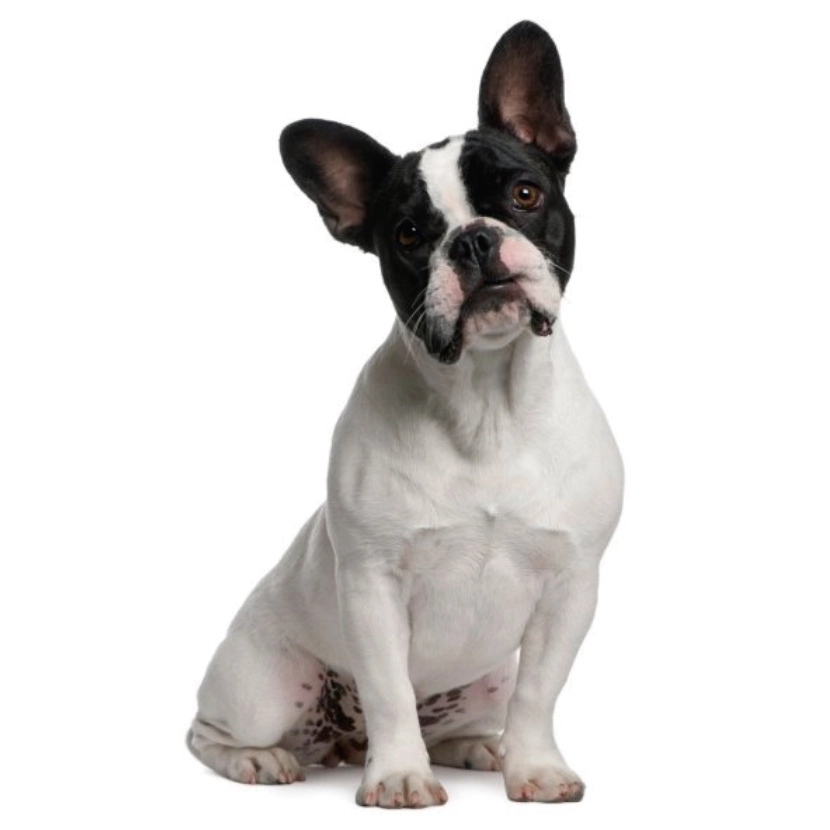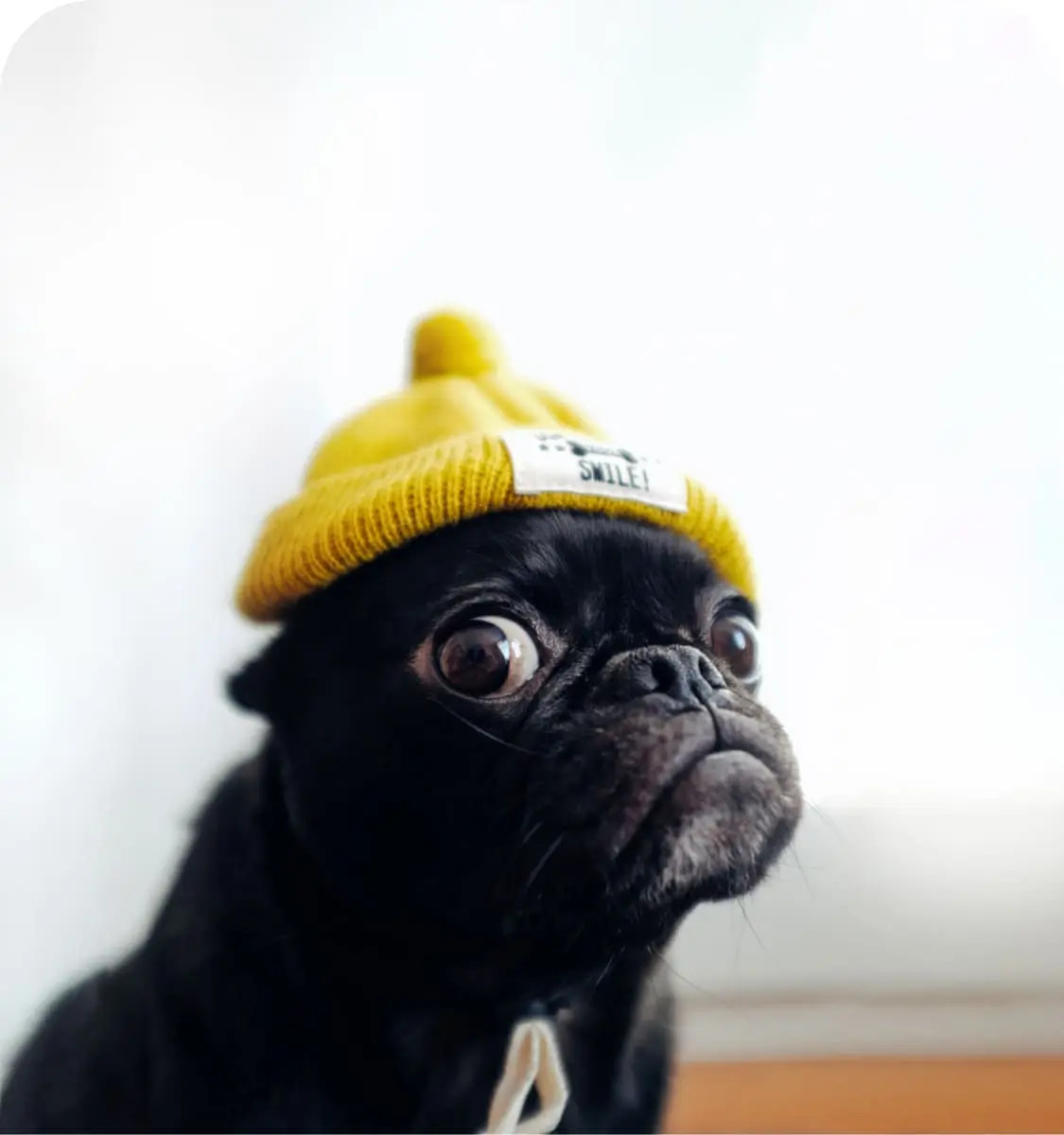French bulldog

Life expectancy
9 - 11 years
Weight
Male 11 - 15 kg
Female 9 - 11 kg
Height
Male 11 - 15 kg
Female 11 - 15 kg
Hair
Satin
Group
Service dog
Nicknames
Frenchie
Index
Related to the American Bulldog and the English Bulldog, the French Bulldog is smaller in size and has an exceptionally playful and good-natured character that adapts easily to different lifestyles and home environments. Frenchies crave a lot of attention and love spending time with their owners.
They are known for being quite clownish, with a mischievous and playful streak in them. They can become a bit possessive and protective of their owners and will occasionally need to be gently reminded who is the alpha dog in the house. They are generally very good with children.
Due to its flattened snout, it does not have much stamina to perform physical activities.
Characteristics of the French bulldog
SIZE
EXERCISE NEEDS
EASY TO TRAIN
GOOD WITH CHILDREN
KINDNESS TO OTHER PETS
HEALTH OF THE BREED
COST TO KEEP
INTELLIGENCE
TOLERANCE TO BEING ALONE
Why choose a French bulldog?
PROS
Good with children but always supervised
Very adaptable, happy to live in an apartment or house
Fun and naughty
It is a good choice for first-time dog owners, as French bulldogs are one of the lowest-maintenance dog breeds.
They only need short walks several times a day rather than especially long walks
They shed little, although, like other breeds, they shed more hair in spring and autumn.
They make wonderful companions because they are very kind and willing to please without being too demanding.
CONS
It is expensive to buy a well-bred puppy from reputable breeders.
The breed can be slow to train and often takes longer than usual to house train
Can be stubborn and demanding at times
They are prone to developing "small dog syndrome" if they are pampered too much.
They can be overly possessive of their owners and families.
They need to be groomed every week, paying special attention to the folds of the skin and the tail.
They can be smelly at times if their coat is not cared for properly.
They are prone to certain hereditary and congenital health problems
They cannot tolerate being alone for long periods of time and often suffer from separation anxiety.
French Bulldogs overheat very quickly in hot weather due to their flatter face.
French bulldog puppies for sale

Whoops! We're very sorry
We currently don't have any puppy litters available
Origin and history of the French bulldog
There is much speculation about the actual origin of the French Bulldog, but it is likely that the breed originated from the Miniature or Toy Bulldog (a cross between English Bulldogs and Terrier-type dogs) that were brought to France by Nottingham workers during the industrial revolution that took place in England during the 19th century. Other people believe that the French Bulldog descends from the Chincha Bulldog, a breed native to ancient Peru and which no longer exists today.
The workers of Nottingham were true enthusiasts of the breed and used these small dogs to warm their laps while they worked. During the Industrial Revolution, they took their dogs with them when they moved to Normandy, France, in search of work. These small dogs soon found favor with the French and became well known. The French especially liked the smaller Bulldogs with upright ears and called them Bouledogue Français. They soon became popular among Parisians and became a fashion symbol for the elite.
The Bouledogue Français was reintroduced to England in 1893, where it met with resistance from English Bulldog breeders, but to avoid the problem the French Bulldog breeders of the time created their own Bulldog Club and held their first show in 1902. The first breed club was established in Paris in the late 19th century and a breed standard was established soon after.
The Kennel Club accepted the Bouledogue Français as a breed in 1903 and a few years later the breed name was changed to French Bulldog. Over the years, the breed standard has been continually updated and more colors have been accepted, including the fawn color.
French bulldog breeders
Character ofthe French bulldog
The French Bulldog is a perfect companion dog that prefers to be around people than to be left alone. They crave human contact and love to play "clowns" whenever they can. They are considered to have slightly below average working intelligence, but are known to make easy and loyal companions to live with due to their sweet and affectionate nature.
They are a good choice for people who live in small homes and apartments, with the good news that they are not known for being "barkers." They like to play and entertain their family, as well as snuggle and sleep with their favorite person.
The French Bulldog is an ideal choice for people who lead a calmer life. However, they need to do regular daily exercise and ideally it should be at least 1 hour a day, as otherwise they can quickly accumulate kilos. Obesity is a real problem for the breed, causing dogs to develop all kinds of health problems and can considerably shorten their lives.
Curiosities about the French bulldog
Great care must be taken when French Bulldogs travel by plane because they are a brachycephalic breed and therefore are more at risk if traveling in cargo holds.
French Bulldogs are not built to be good swimmers and you should always be careful around water.
Frenchies are very sensitive dogs by nature and hate being yelled at.
A 9-year-old Frenchie named Bugsy adopted a baby orangutan named Malone at Twycross Zoo and cared for the baby until he was old enough to join the adult orangutans.
French Bulldogs are not "barkers", but they are a naturally talkative breed and will carry on long conversations with the people they love.
Names for French bulldog
Paco, Thor, Mango, Greta, Rocky
The French bulldog of our breeders

Whoops! We're very sorry
There are currently no dogs of this breed